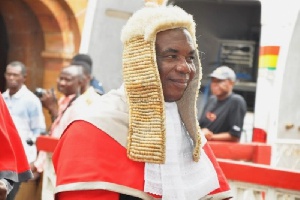A Supreme Court judge has appealed to judges and magistrates to be fair and firm in adjudicating election-related cases so that political parties would not take the law into their hands.
Mr Justice Jones Victor Dotse, tasked members of the lower bench to be consistency in sentencing so that they do not send the wrong signal to the society.
He was speaking at a training programme on election (Registration of Voters) Regulation, 2016, Constitutional Instrument (CI 91) for selected judges and magistrates in Accra.
The programme held in collaboration with the DFID and UK government would offer the judges the opportunity to dispense justice in objections raised during Voter Registration and exhibition of Voters Register.
While the lower courts would be members of District Registration Review Committees, those at the High Courts would be an appellate body by exercising their duties as Chief Registration Review Officers.
Mr Dotse noted that when judges and magistrates give different sentencing on election-related cases, it creates unpleasant situations in the society.
He reminded the trainees of the powers vested in them by the Constitution, adding that Parliament or the Presidency could not take those powers, hence the need to be abreast of Voter Regulation CI 91.
Mr Justice Dotse, who is the Chairman of the Judicial Training Institute, told the Judges and Magistrates that CI 91 is quite different from the previous laws as presently there is no use of National Health Insurance Cards.
He said as Judges and Magistrates they would have friends in the society but they should clothe themselves with absolute integrity and competence and dispense justice without fear or favour.
“If anybody falls foul to the law, sanctions must be applied,” he added.
Mr Justice Sule Gbadegbe, a Supreme Court Judge, urged the Magistrate and Judges not uses technicalities to dismiss cases and determine each case on its merit.
Mr Justice Gbadegbe who is a also member of the Election Taskforce Committee, tasked them to ensure that parties in a matter are given equal opportunities in court and desist from delaying in judgement delivery as election-related cases are time bound.
He also charged them to readily make available their decisions to the Electoral Commission and parties in a matter.
General News of Friday, 27 May 2016
Source: atinkaonline.com

















